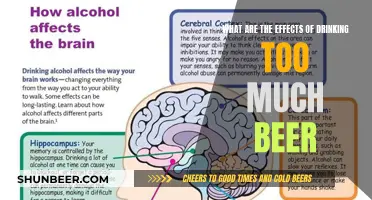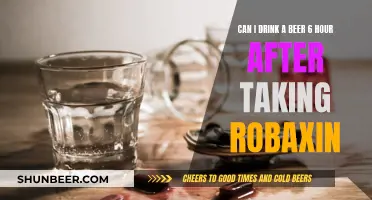
Beer typically has a ''best before' date rather than a 'use by' date, meaning it's safe to drink after the date on the container, but the taste will deteriorate over time. Beer won't be dangerous to drink, but it may develop unpleasant tastes and aromas. The flavour and quality will degrade, and it may lose its carbonation. However, some beers, such as stouts and porters, can improve with age, similar to wine.
| Characteristics | Values |
|---|---|
| Will drinking out-of-date beer make you sick? | No, it will not make you sick or hurt you in any way. |
| Will drinking out-of-date beer harm you? | No, but it may not taste good. |
| Will drinking out-of-date beer be a pleasant experience? | It depends on the type of beer, how it was stored, etc. |
| How can you tell if a beer has gone bad? | It will have a bad aroma, lack the usual 'pssst' sound and foaming when you open it, and may have excessive sediment at the bottom of the bottle. |
| What factors contribute to beer expiration? | Oxidation, exposure to UV light, microbial contamination, and temperature fluctuations. |
| How long does beer last? | Beer has a 'best before' date, and its quality changes over time. A typical lager will be drinkable 6–24 months after its best before date if kept in the fridge, and up to 9 months if not refrigerated. Some beers, like barley wines and imperial stouts, can last for years and improve with age. IPAs, on the other hand, lose their flavour and aroma over time and are best drunk fresh. |
| How to store beer so it doesn't go bad? | Keep it in the fridge, in a cool, dry place, out of direct sunlight, and store bottles upright. |
What You'll Learn

Beer doesn't go bad like food does
That being said, beer does have a shelf life and will undergo changes in flavour, aroma, and quality over time. The "best before" date on a beer is more of a guideline on quality rather than safety. Beer will start to lose its quality after this date, and the taste and smell will change, especially if it hasn't been refrigerated. However, this doesn't mean that the beer will be unpleasant to drink. In fact, some beers, like wine and whiskey, can improve with age. Richer and higher ABV varieties, such as porters and stouts, can get better with age if they're kept in cool, dark storage conditions.
On the other hand, IPAs, especially hoppy ones, gradually lose their flavour and aroma over time and are best drunk sooner rather than later. Lighter styles like lagers and pilsners also have a shorter shelf life. Additionally, exposure to oxygen, heat, and light can cause flavours to go awry. Oxygen interacts with the compounds from malt, yeast, and hops, causing oxidation and a disappointing papery taste. Heat speeds up oxidation, and light can cause a chemical reaction that gives off an unpleasant skunky taste.
So, while beer doesn't spoil or become unsafe to consume like perishable food does, it's still best to consume it within a certain time frame to ensure optimal flavour and quality.
Beer Gas: How Does It Work?
You may want to see also

Beer is unlikely to make you sick
Beer can expire in several ways, however, none of which will make you sick. When beer comes into contact with oxygen during the brewing, packaging, or storage process, it can oxidize, causing the oxygen to react with the beer's chemical makeup and break down hop oils and other flavor compounds. This results in off-flavors, such as a cardboard-like or stale taste, and a reduced aroma.
Beer in clear or green bottles can also become "skunky" when exposed to UV light due to a photochemical reaction between the UV light and the hop compounds in the beer. This results in a distinctive sulfur-like smell and a corresponding off-flavor.
Commercial beers are well-pasteurized and filtered, but improper brewing practices, packaging errors, or poor storage conditions can lead to bacterial contamination. Unintended wild yeast infestations can also contaminate beer, especially in home brews or improperly sealed commercial brews. Contaminated beer can taste sour, musty, or metallic, and may become cloudy or develop unexpected sediment.
Finally, temperature fluctuations can affect beer. High temperatures accelerate chemical reactions that break down delicate flavor compounds, while freezing can cause the beer to expand, potentially breaking the container and introducing oxygen upon thawing. This can lead to off-flavors and affect the beer's carbonation, resulting in flat or overly fizzy beer.
In summary, while beer can expire and develop off-flavors and aromas, it is unlikely to make you sick due to the alcohol and hops preventing pathogenic growth.
Beer Belly Blues: Preventing Gas After Drinking Beer
You may want to see also

Beer's taste changes over time
Beers Taste Changes Over Time
Beer is a fragile drink that requires specific conditions to maintain its freshness, flavour, and overall quality. While it won't make you sick, the taste of beer changes over time, and what was once a refreshing treat could become a real stinker.
Factors That Affect Beer Taste
Oxygen
Oxygen interacts with the compounds from malt, yeast, and hops, causing oxidation and a disappointing papery taste. Despite all the advanced techniques and newfangled technology brewers use to package beer, there’s still a tiny amount of oxygen that’ll make it into a can or bottle, which means a change in flavour is inevitable. Once a bottle or can of beer is opened, oxidation goes into hyperdrive, and if the beer is left out for long, you’ll be left with a sad version of the beverage.
Heat
Heat speeds up oxidation, so storing beer in a refrigerator is a must. Major changes in temperature, like from an ice-cold cooler to a hot car, make it even worse. Sadly, this can’t be reversed. Once beer has been left in a hot trunk or in the summer sand, you’ll have to discard it.
Light
Most people assume skunkiness comes from changes in temperature, but it’s actually caused by UV light. Hop compounds are especially sensitive to light and can become "light struck", a chemical reaction that gives off an unpleasant skunky taste. That’s why beer usually comes in dark bottles, which is helpful, but not as good as aluminium cans at blocking out those piercing rays.
Beer Types and Their Taste Changes Over Time
Hoppy Beers (IPAs, Pale Ales)
Hoppy beers have a shelf life of 3 to 6 months unopened for the best hop character. They can last up to a year but with diminished hop intensity. IPAs gradually lose their flavour and aroma over time and are best drunk sooner rather than later.
High-ABV Beers (Barley Wines, Belgian Quads)
High-ABV beers have a shelf life of several years. They often improve with age due to high alcohol content.
Dark Beers (Stouts, Porters)
Dark beers have a shelf life of 1 to 2 years unopened. They can improve with age due to malt-forward flavours.
Light Beers (Pilsners, Pale Lagers)
Light beers have a shelf life of 6 to 12 months unopened. They are best consumed within 3 to 6 months for peak flavour.
Pale Ales and IPAs
Pale ales and IPAs are best consumed within 3 to 6 months to enjoy the peak of their hop character. Hoppy flavours diminish over time.
Sours and Wild Ales
Sours and wild ales can last several years with flavours evolving over the years.
Beer and Blood Donation: Can They Mix?
You may want to see also

Beer should be stored in a cool, dark place
To avoid this, beer should be kept out of direct sunlight and fluorescent lights. A dark, cool place like a cellar or a closet is ideal for storage. Brown bottles offer better protection against UV light compared to clear or green bottles, and aluminium cans provide excellent protection against light.
Temperature control is also important. Beer should be stored at a consistent temperature between 45 and 55°F (7 and 13°C). Avoid temperature fluctuations, as high temperatures can hasten oxidation and spoilage.
By storing beer in a cool, dark place, you can help maintain its optimal flavour, freshness, and overall quality.
Beer and Whiplash: What You Should Know
You may want to see also

Beer should be consumed as fresh as possible
Beer is a delicate drink, and while it won't necessarily make you sick if consumed past its expiration date, it is always best to drink it as fresh as possible. Beer doesn't spoil in the same way that perishable foods do, but it can lose its robust flavours and its quality can deteriorate over time.
The fermentation process, low pH level, and alcohol content of beer create an environment that is unfriendly to microorganisms, so it is unlikely to make you ill, even if consumed years after its expiration date. However, the taste of beer changes over time, and what was once refreshing might become less palatable.
The shelf life of beer depends on several factors, including the type of beer, how it is stored, and whether it is bottled, canned, or kegged. For example, a typical lager will be drinkable for 6-24 months past its best-before date if kept in the fridge, whereas an IPA is best consumed within 3-6 months to enjoy its hoppy character.
To maintain the optimal flavour of your beer, it is important to store it at a consistent temperature between 45 and 55°F (7 and 13°C) and to avoid direct sunlight and fluorescent lights. Brown bottles and aluminium cans provide excellent protection against light, whereas clear or green bottles offer less protection. Additionally, storing bottles upright helps minimise the surface area exposed to air, and keeping them upright helps any sediment settle at the bottom.
How Long to Wait Before Drinking Homebrewed Beer?
You may want to see also
Frequently asked questions
Yes, you can drink beer after its expiration date. Beer is a perishable product that stales when exposed to light, oxygen, and heat, but it is pasteurized or filtered to eliminate bacteria, so it is extremely resistant to spoiling. However, the flavour will degrade over time.
Beer can be consumed up to 5 to 9 months beyond the expiration date listed on the label if stored at room temperature. In a refrigerator, beer can last up to an additional two or three years.
Expired beer is known to be less carbonated, and the flavours are off. It tends to lose its hoppiness and develop a stale flavour described as "cardboard".







